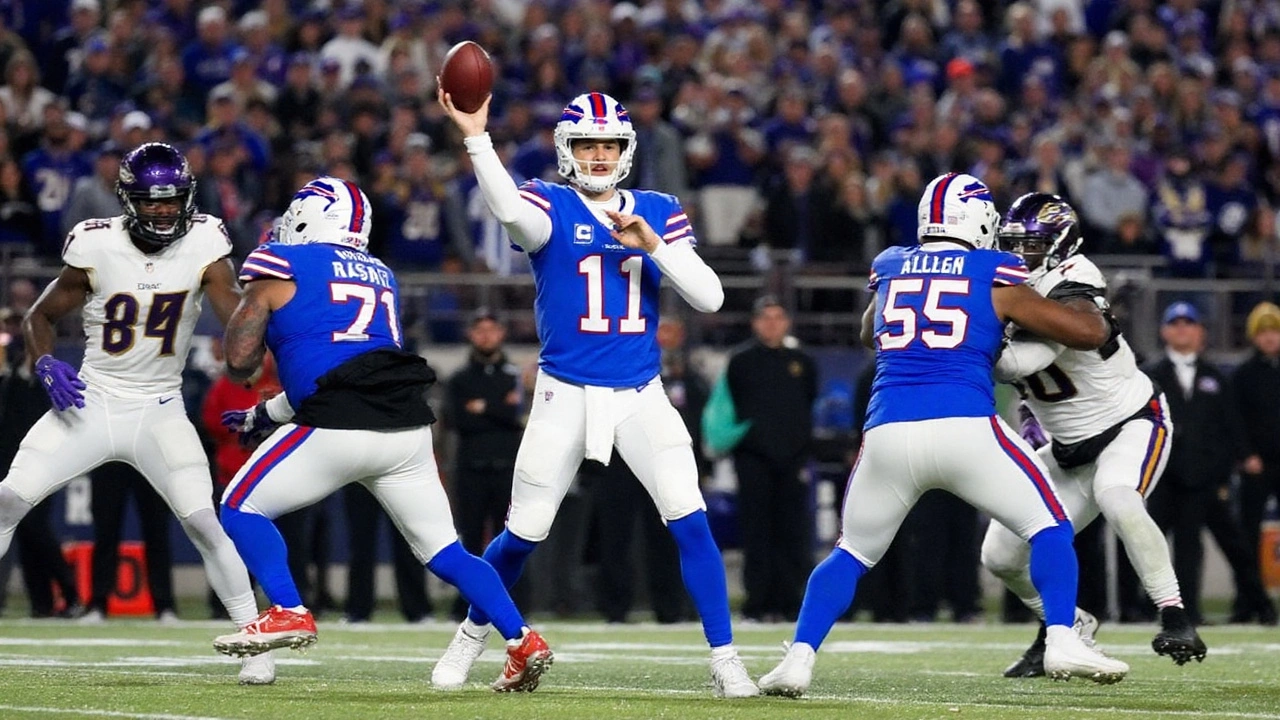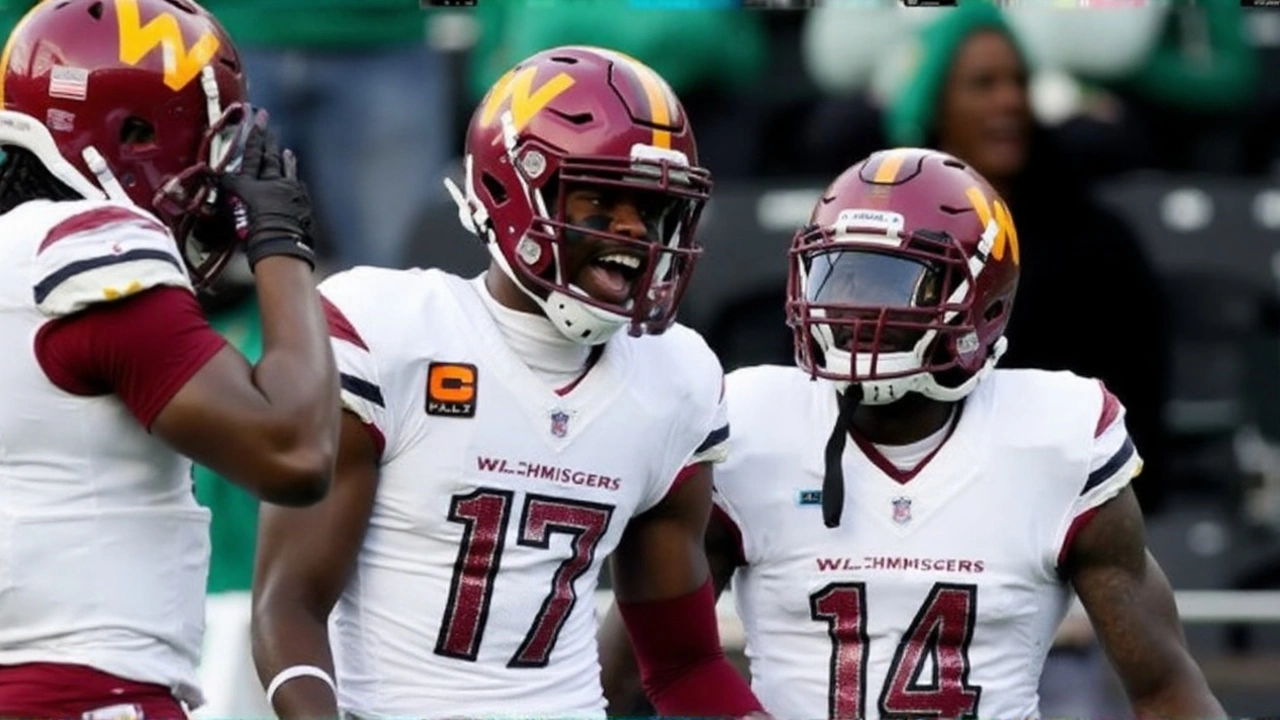Philadelphia unloads 55 on Washington to book a Super Bowl trip
Fifty-five points in a conference title game. No team had hit that mark in the merger era until Sunday night in South Philly, where the Eagles turned a tight first half into a runaway and flattened the Commanders 55-23 to clinch a spot in Super Bowl LIX.
It was the kind of one-sided postseason performance that grabs the league by the collar. Saquon Barkley blew the doors open on his first two touches, ripping 64 yards and scoring twice before the crowd had settled. Jalen Hurts, wearing a brace on his left knee, matched him with three rushing touchdowns and added 246 yards through the air and a scoring strike. The scoreboard kept humming, the towels kept twirling, and the night ended with confetti and a record: the most points in a conference championship since the 1970 merger.
“I came to Philly to be part of games like this,” Barkley said, still in his eye-black and grin. “And there’s nothing better than a game where you can advance to the Super Bowl.”
Nick Sirianni has heard the questions about his quarterback. He answered them again by pointing to the result. “I don’t want anybody else leading this team at quarterback other than him. He’s a winner,” the head coach said. “He deals with so much criticism, which blows my mind. This guy wins. He’s won his entire life.”
From the jump, the Eagles played on their terms. The run game set the leverage, the RPOs froze Washington’s second level, and Hurts’ legs tilted the red zone in Philly’s favor. Even with a knee brace, he showed the same short‑area burst that has punished defenses inside the 10 all season. Washington’s front hesitated just long enough for Barkley to slice through creases and for Hurts to finish drives with power.
A.J. Brown provided the knockout flourish. He hauled in six catches for 96 yards and a touchdown, then celebrated with a mischievous bit, pretending to toss the NFC trophy from a platform before flashing a smile. It fit the mood: playful, confident, a team peaking when the calendar says you have to.
Washington did not vanish quietly. Rookie quarterback Jayden Daniels held his nerve for much of the night, throwing for 255 yards with a touchdown and one interception. His legs extended plays, his eyes stayed downfield, and he kept the Commanders within striking distance into the third quarter. But four turnovers are a playoff death sentence, and the most damaging miscue was a hard-luck fumble by Austin Ekeler with Washington down 34‑23. The Eagles pounced, scored again, and never looked back.
That takeaway summed up the night. Philadelphia’s pass rush didn’t rack up gaudy numbers, but it squeezed Daniels’ launch points and made every completion feel contested. Coverage held long enough to force late throws, and rally tackling cut off yards after catch. Special teams did their part too, pinning Washington deep and tilting field position so the offense kept getting short fields.
The quarter-by-quarter flow told the story. Philly led 14‑3 after one, 27‑15 at the half, and 34‑23 after three. Then came the avalanche: 21 unanswered in the fourth, and a wave of sound that rolled from the 100 level to the last row. Lincoln Financial Field didn’t exhale until the celebration was on.
This is the fifth Super Bowl trip in franchise history and the third in eight seasons, a remarkable run for a roster that has changed its stars but kept its core identity: win the line of scrimmage, stress defenses with dual‑threat quarterbacking, and hammer situational football. After a 2‑2 start before their bye, the Eagles recalibrated. They leaned harder into the run game behind a bruising line, let Barkley’s lateral cuts set up second‑and‑short, and used Hurts’ keeper game to punish overplays. Sunday was that blueprint at full volume.
History sat in the score. The Eagles’ 55 is their highest postseason output and a high‑water mark in a modern conference title game. Blowouts happen in January, but they usually come from turnovers piling up or weather shrinking playbooks. This was different. Philly unlocked every door: explosive runs, designed QB keepers, shot plays over the middle, and tight red‑zone calls that Washington never solved.
There was style amid the substance, too. Brown’s touchdown felt like a release for a player who has battled bracket coverage and double‑teams all season. DeVonta Smith’s route running opened windows even when the ball didn’t find him. And the tight ends did the dirty work, sealing edges and clearing alleys for Barkley and Hurts to punch in.
On the other sideline, Daniels’ night was a reminder of why Washington’s future looks brighter than its last few years. He worked through reads, trusted his arm, and kept taking smart singles when explosives weren’t there. It is brutally hard for a rookie to drag a team to a Super Bowl. None has ever done it as a starting quarterback. Daniels got within 60 minutes and ran into a deeper, cleaner operation.
Washington’s postseason road was no fluke. They went on the road and stunned the top‑seeded Lions last week, then lined up in Philly and threw punches for three quarters. But January margins are razor‑thin, and the Commanders learned the cruelest lesson: you can play well for long stretches and still lose big if you lose the ball. A single turnover swung momentum; the next one swung the score.
Inside the Eagles’ locker room, the tone was measured. There was joy, sure, but also the steady drumbeat of a team that’s been here before. Players talked about stacking practices, about the next plane, about New Orleans. Hurts brushed off knee questions, the way he has for weeks, and put the focus back on preparation. No one pretended this was a finish line.
There’s also a roster‑building subplot to this run. The Barkley signing was a bet on star juice and playoff leverage. Philadelphia paid for a closer in the run game, someone who forces safeties to creep and makes linebackers wrong even when they guess right. In January, that value multiplies. Short fields become seven instead of three. Second‑and‑goal becomes one cut and six points.
Defensively, the Eagles didn’t chase sacks; they chased outcomes. Set edges, spill runs to help, rally to the ball, and take your chance when the ball is exposed. You saw it on the Ekeler fumble. You saw it when tight coverage forced the lone interception. The raw numbers will say “only” one pick, but the hidden wins were everywhere: broken timing, narrow throwing windows, and Washington drives that stalled just outside field‑goal range.
By the way, the atmosphere mattered. Home field doesn’t tackle anyone, but it makes life harder for visiting protections and younger quarterbacks. False steps happen when you can’t hear. Delays happen when the play clock vanishes under noise. The Linc was loud from the first Barkley burst and never really came down.
What does 55‑23 mean in the bigger picture? It’s proof of concept for Sirianni’s offense when it’s on schedule and ahead of the sticks. It’s proof that Hurts’ power run element is still a trump card in the red zone. And it’s proof that complementary football still wins in January: four takeaways, efficient finishing, and special teams that do not blink.
One more thing the score did: it changed the conversation about Hurts. The criticism has hung around him even as the wins stack up, often nitpicking throws he doesn’t take or yardage he doesn’t need. Quarterbacks are judged in these moments. Hurts authored one of the most complete title‑game performances you’ll see — control at the line, patience from the pocket, and the kind of short‑yardage dominance that breaks defenses’ backs.
- Scoring record: 55 points, the most in a modern conference title game.
- Ground game: Barkley and Hurts combined for six rushing touchdowns.
- Through the air: Hurts threw for 246 yards and a touchdown; A.J. Brown posted 6 receptions, 96 yards, and a score.
- Takeaways: Washington committed four turnovers, including Austin Ekeler’s pivotal third‑quarter fumble at 34‑23.
- Score by quarters: Eagles led 14‑3 (Q1), 27‑15 (halftime), 34‑23 (Q3), then closed with 21 in the fourth.
For Washington, the offseason now starts with a clear directive: protect the ball and add help around your young quarterback. Daniels showed enough poise to anchor a rebuild. The playoff win in Detroit will linger as proof that the core can handle bright lights. What they didn’t have Sunday was margin for error. Against a heavyweight, you need it. The Eagles erased it.
Philadelphia’s reward is a flight to New Orleans and a date with either the Bills or the Chiefs on Feb. 9 at the Caesars Superdome. If it’s Kansas City, it’s a rematch of a recent title showdown. If it’s Buffalo, it’s the league’s hottest cannonball and a fascinating chess match against a power quarterback. Either way, the Eagles will carry the tape that says they can score from anywhere on the field and win a rock fight at the goal line.
Travel and logistics will fill the next few days. Install starts, game plans narrow, and Hurts’ knee will be monitored as it has been. The Eagles’ staff will cut the menu to what travels best: the base runs that bully, the shot plays that punish stacked boxes, and the red‑zone calls that shrink the field for a defense but not for this quarterback.
One number will hang over the week: 55. It’s loud, and it will dominate headlines. But inside the building, they’ll point to the subtler math — negative plays avoided, penalties when they didn’t kill drives, and a turnover margin that buys you extra possessions. That is how January becomes February.
It started with a burst and ended with a romp. The Commanders arrived with momentum after stunning Detroit. The Eagles greeted them with Barkley’s first‑touch lightning, Hurts’ steady hand, and a defense that closed its fist around the second half. And the crowd? It wrote the soundtrack. The towels spun, the chants rose, and the scoreboard told the rest.
Next stop: New Orleans. The Eagles are back on the biggest stage, carrying a record‑setting win and a reminder of who they are when it matters most. Call it swagger, call it structure, call it both. Either way, Philly just put the league on notice in the NFC Championship.

What it means for both franchises now
For the Eagles, the window remains wide open. Three Super Bowls in eight years isn’t a blip; it’s era‑defining. They’ve changed coordinators, swapped stars, weathered injuries, and still found the formula when it counts. Continuity in philosophy has mattered more than continuity in names.
For the Commanders, this run matters, too. Playoff wins change expectations and accelerate development. Daniels got live reps you cannot fake, against a defense bent on forcing him to hold the ball a tick longer. That experience reshapes what an offseason can be: targeted additions, refined protections, and a plan built around what their rookie already does well.
There’s a reason January separates teams. It punishes loose edges. Philly’s edges are tight right now — in the trenches, in the red zone, and in the moments when one snap swings everything. If they carry that to New Orleans, they won’t need 55. They’ll just need the same clarity that turned a tense night into a party.

